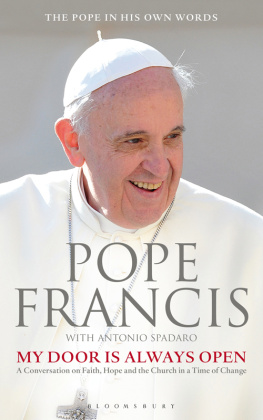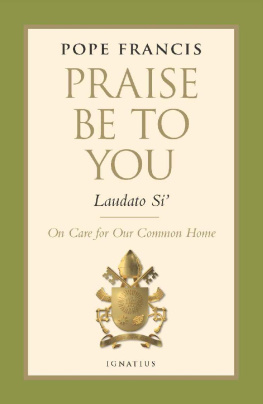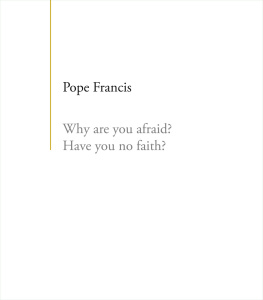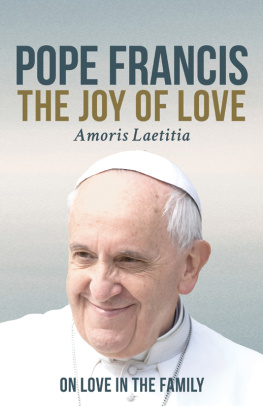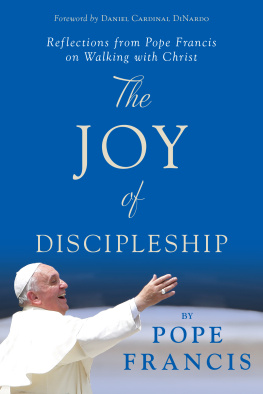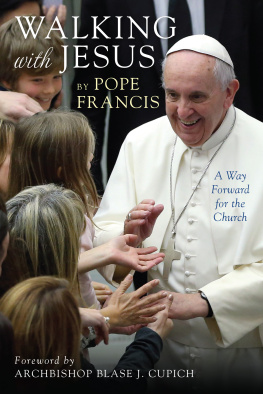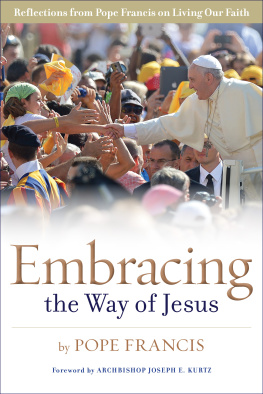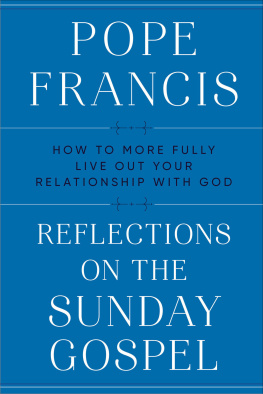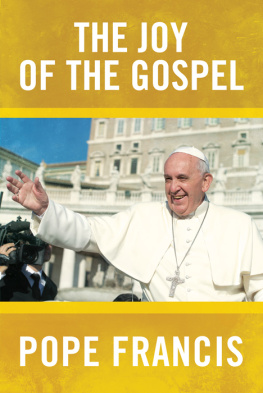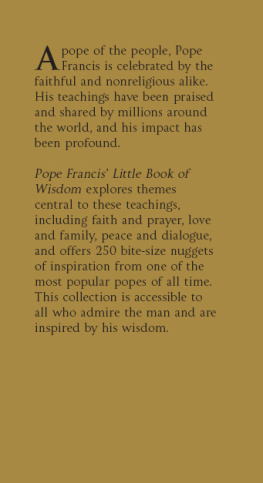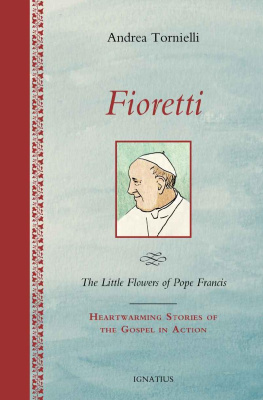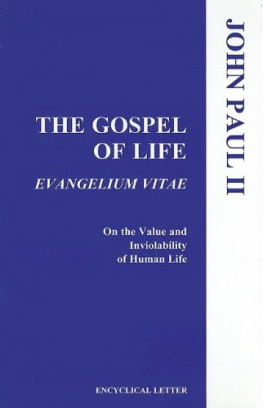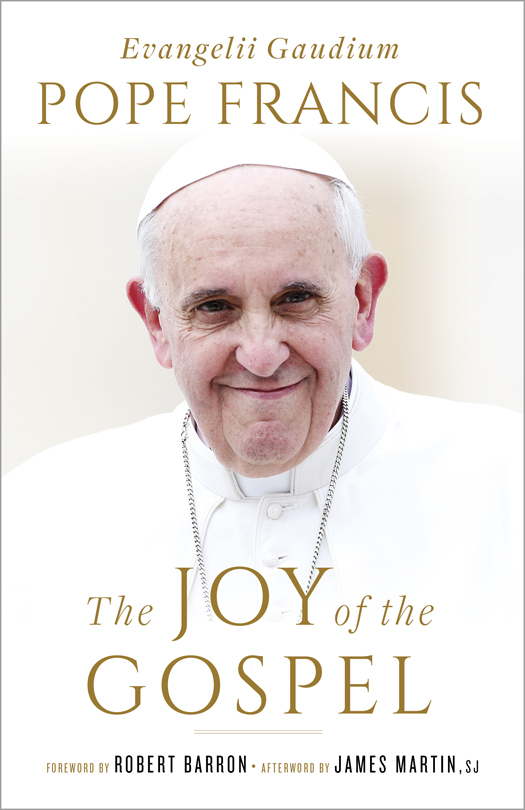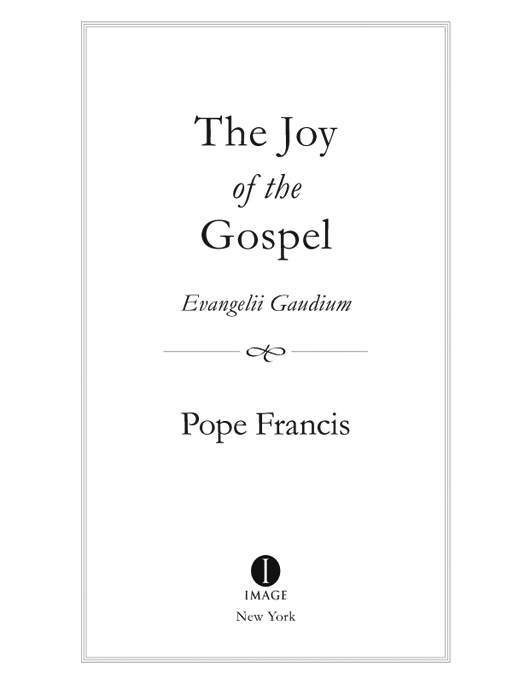Copyright 2013 by Libreria Editrice Vaticana
Foreword and afterword copyright 2014 by Random House LLC
All rights reserved.
Published in the United States by Image, an imprint of the Crown Publishing Group, a division of Random House LLC, New York, a Penguin Random House Company.
www.crownpublishing.com
IMAGE is a registered trademark and the I colophon is a trademark of Random House LLC.
Library of Congress Cataloging-in-Publication data
Catholic Church. Pope (2013 : Francis).
[Evangelii Gaudium. English]
The joy of the gospel = Evangelii Gaudium / Pope Francis ; foreword
by Robert Barron ; afterword by James Martin, S.J. First Edition.
pages cm
Includes index.
ISBN 978-0-553-41953-5
1. Mission of the church. 2. Evangelistic workCatholic Church.
3. Catholic ChurchDoctrinesPapal documents. 4. Encyclicals,
Papal. I. Francis, Pope, 1936 II. Title. III. Title: Evangelii Gaudium.
BX1746.C338513 2014
266.2dc23
2014034023
ISBN 978-0-553-41953-5
eBook ISBN 978-0-553-41954-2
Jacket photograph: Getty Images
v3.1_r1
CONTENTS
F OREWORD
by Very Reverend Robert Barron
CHAPTER ONE
The Churchs Missionary Transformation
CHAPTER TWO
Amid the Crisis of Communal Commitment
CHAPTER THREE
The Proclamation of the Gospel
CHAPTER FOUR
The Social Dimension of Evangelization
CHAPTER FIVE
Spirit-Filled Evangelizers
A FTERWORD
by James Martin, SJ
FOREWORD
The Joy of Evangelizing
Very Reverend Robert Barron
An emergency tends to focus ones mind and to clarify ones priorities. If a fire breaks out in a home, the inhabitants thereof will lay aside their quarrels, postpone their other activities, and together get to the task of putting out the flames. If a nation is invaded by an aggressor, politicians will quickly forget their internecine squabbling and put off their legislative programs in order to work together for the shared purpose of repulsing the enemy.
Christianity is grounded in what its earliest proponents called good news, euangelion. There is, therefore, something permanently fresh, startling, and urgent about the Christian faith. It is not a bland spirituality or generic philosophy; it is news about something astonishing and unprecedented, namely, that a carpenter from Nazareth, who declared himself the Son of God, has been raised from the dead. This is why there is a grab you by the lapels quality about the early Christian witness. The authors of the New Testament are not trading in generalities and abstract principles; they are telling the world about a revolution, an earthquake, an emergency. Jesus is risen from the dead, and therefore your whole life has to be rearranged around him.
This evangelical urgency, which Pope Francis gets in his bones, is the leitmotif of the popes Apostolic Exhortation Evangelii Gaudium. He knows that if Catholicism leads with its doctrines it will devolve into an intellectual debating society, and that if it leads with its moral teaching it will appear, especially in our postmodern cultural context, fussy and puritanical. It should lead today as it led two thousand years ago, with the stunning news that Jesus Christ is the Lord, and the joy of that proclamation should be as evident now as it was then. The pope helpfully draws our attention to some of the countless references to joy in the pages of the New Testament: Rejoice! is the angels greeting to Mary; in her Magnificat, the Mother of God exults, My spirit rejoices in God my savior; as a summation of his message and ministry, Jesus declares to his disciples, I have said these things to you so that my joy may be in you and your joy may be complete; in the Acts of the Apostles, we are told that wherever the disciples went there was great joy. The pope concludes with a wonderfully understated rhetorical question: Why should we not also enter into this great stream of joy? Why not indeed? Displaying his penchant for finding the memorable image, Pope Francis excoriates Christians who have turned into querulous and disillusioned pessimists, sourpusses, and whose lives seem like Lent without Easter. Such people might be smart and they might even be morally upright, but they will never be successful evangelists.
Once this basic truth is understood, the rest of the churchs life tends to fall more correctly into place. A church filled with the joy of the resurrection becomes a band of missionary disciples, going out to the world with the good news. Ecclesial structures, liturgical precision, theological clarity, bureaucratic meetings, and so on are accordingly relativized in the measure that they are placed in the service of that more fundamental mission. The pope loves the liturgy, but if evangelical proclamation is the urgent need of the Church, an ostentatious preoccupation with the liturgy becomes a problem; a Jesuit, the pope loves the life of the mind, but if evangelical proclamation is the central concern of the Church, then a narcissistic and authoritarian doctrinal fussiness must be eliminated; a man of deep culture, Pope Francis loves the artistic heritage of the Church, but if evangelical proclamation is the fundamental mission, then the Church cannot become a museum piece. This last point calls vividly to mind something that Angelo Giuseppe Roncalli said on the eve of the conclave that would elect him Pope John XXIII: We are not here to guard a museum, but to cultivate a flourishing garden of life.
The most controversial and commented upon section of this apostolic exhortation has to do with matters economic and political. Some pundits in the United States went so far as to suggest that Pope Francis revealed in these meditations his true colors as a leftist, even a Marxist. In point of fact, he is speaking in continuity with the mainstream of the Catholic Churchs social teaching. When he excoriates an economy of exclusion, he is echoing St. Pope John Paul II, who taught that a healthy capitalism is structured in such a way as to draw more and more people to participate in its benefits. When he criticizes an idolatry of money, he echoes Pope Leo XIII, who taught that once the demands of necessity and propriety have been met, everything else that one owns belongs to the poor. And when he observes that much of the discontent in our contemporary society is prompted by social disparities and inequalities, he echoes the Vatican II document Gaudium et Spes, which teaches that power and wealth ought ideally to be spread out as widely as possible within the human community. What is most important to keep in mind is that this teaching on economics is situated within the wider context of Franciss call to evangelize. His overarching point is that a Christian community that remains indifferent to injustice within the society will have little or no persuasive power when it attempts to announce its message of salvation.
If there is one thing that bothers Pope Francis above all it is the endless bickering within the Catholic Church itself: how many wars take place within the people of God and in our different communities! Elitists on both the left and the right want to establish a Church of the purethose who hold all of the right positions on the key issuesand they are none too shy about critiquing, attacking, and excommunicating those who dont agree with them. But the Church is meant to be a countersign to the divisiveness and violence of the world, a place where love, compassion, and mutual understanding hold sway. When we become but an echo of the fallen world, then we are like salt that has lost its savor, and our evangelical persuasiveness is fatally compromised. When I was coming of age in the 1960s and 1970s, the Catholic Church, at least in the West, was marked by an extraordinary disputatiousness, especially in matters of sexuality and authority. Mind you, I dont think for a moment that those questions are unimportant or that those who engaged them were of bad will, but I do indeed think that the preoccupation with them undermined the Churchs evangelical winsomeness. Again, keep in mind the metaphor of the emergency: when a threat or an opportunity of great moment appears, we ought to lay aside our petty (and even not so petty) differences and make common cause.


